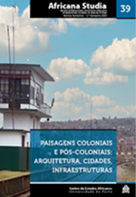Surveying essences, producing culture: virgin landscapes and the architectural reinvention of the late Portuguese empire
Abstract
Discoursively glocal architectures play a key role in today’s architectural norms and forms. This is also the case in Portugal where modern pedigreed architecture harnesses some form of local tradition and cultural reification as credentials. This article argues this is partly rooted in the cultural discourses developed within the post-war colonial project of the Portuguese dictatorship (Estado Novo), intersecting modernization with imperial reorganization, and in which architectural modernist ideals of autonomy and liberty played a direct role. The article contends the appropriation of these ideals needs to be considered in a double light: as a sign of progress for a professional elite and as a new mask for an old and violent system of inequality.
The article explores the colonial infra-structuring of post-war architectural knowledge, questioning the role of “virgin” landscapes in re-creating professional practice rallied by colonial modernization. The article examines how ethnographic processes were integrated into architectural creation, inspiring “culturally committed” forms of “Portuguese” modernism
and imperialism. Offering a critique and cultural debate of the entanglements between architecture, anthropology, nation and empire, the article aims to contribute to architecture’s political history and to debates on the role of modern spatial practices in the creation of racial categories.
Keywords: Architecture, ethnography, modernism, colonialism.
Downloads
Downloads
Published
How to Cite
Issue
Section
License
Copyright (c) 2024 Africana Studia

This work is licensed under a Creative Commons Attribution-NonCommercial 4.0 International License.
Copyrights of all published material belong to Africana Studia.
Original images supplied by authors will be returned to them if requested


